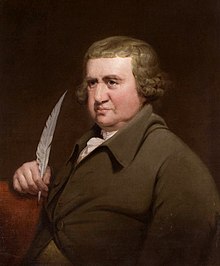Lichfield Botanical Society
| Erasmus Darwin | |
|---|---|

Erasmus Darwin c. 1792–1793, oil painting by Joseph Wright of Derby, Derby Museum and Art Gallery
|
|
| Born |
12 December 1731 Elston Hall, Elston, Nottinghamshire near Newark-on-Trent |
| Died | 18 April 1802 (aged 70) Breadsall, Derby |
| Resting place | All Saints Church, Breadsall |
| Residence | Lichfield |
Erasmus Darwin (12 December 1731 – 18 April 1802) was an English physician. One of the key thinkers of the Midlands Enlightenment, he was also a natural philosopher, physiologist, slave-trade abolitionist, inventor and poet. His poems included much natural history, including a statement of evolution and the relatedness of all forms of life. He was a member of the Darwin–Wedgwood family, which includes his grandsons Charles Darwin and Francis Galton. Darwin was a founding member of the Lunar Society of Birmingham, a discussion group of pioneering industrialists and natural philosophers. He turned down an invitation of George III's to become a physician to the King.
Erasmus Darwin House, his home in Lichfield, is now a museum dedicated to Erasmus Darwin and his life's work. A school in nearby Chasetown recently converted to Academy status and is now known as Erasmus Darwin Academy.
Darwin was born in 1731 at Elston Hall, Nottinghamshire near Newark-on-Trent, England, the youngest of seven children of Robert Darwin of Elston (12 August 1682 – 20 November 1754), a lawyer, and his wife Elizabeth Hill (1702–97). The name had been used by a number of his family and derives from his ancestor Erasmus Earle, Common Sergent of England under Oliver Cromwell. His siblings were:
...
Wikipedia
